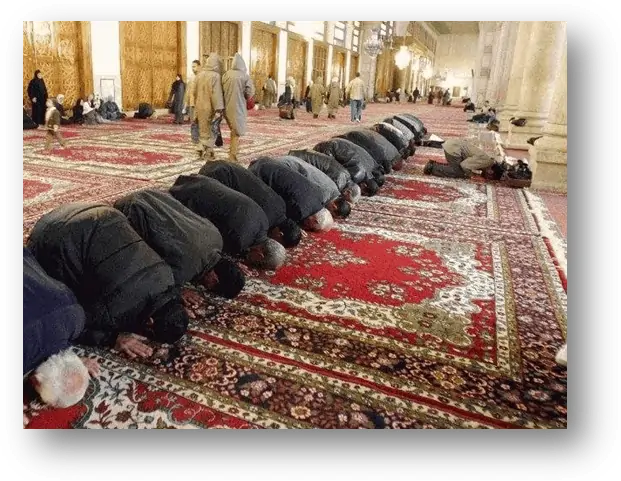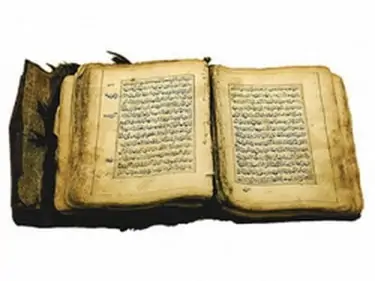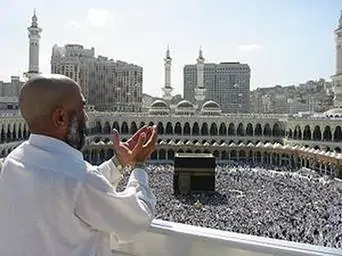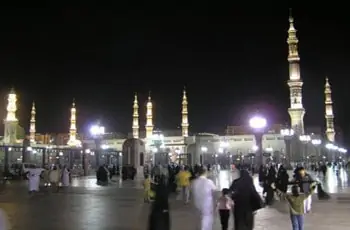Muhammad: Seal of the Prophets
The Prophet as the founder of Islam and the messenger of God’s revelation to mankind is the interpreter par excellence of the Book of God; and his Hadith and Sunnah, his sayings and actions are, after the Qur’an, the most important sources of the Islamic tradition.
Spiritual Nature
The spiritual nature of the Prophet is veiled in his human one and his purely spiritual function is hidden in his duties as the guide of men and the leader of a community. It was the function of the Prophet to be not only a spiritual guide, but also the organizer of a new social order with all that such a function implies. And it is precisely this aspect of his being that veils his purely spiritual dimension from foreign eyes. Outsiders have understood his political genius, his power of oratory, his great statesmanship, but few have understood how he could be the religious and spiritual guide of men and how his life could be emulated by those who aspire to sanctity. This is particularly true in the modern world in which religion is separated from other domains of life and most modern men can hardly imagine how a spiritual being could also be immersed in the most intense political and social activity.
Social Nature
The Prophet did participate in social life in its fullest sense. He married, had a household, was a father and moreover he was ruler and judge and had also to fight many wars in which he underwent painful ordeals. He had to undergo many hardships and experience all the difficulties which human life, especially that of the founder of a new state and society, implies. But within all these activities his heart rested in contentment with the Divine, and he continued inwardly to repose in the Divine Peace. In fact his participation in social and political life was precisely to integrate this domain into a spiritual centre.
Contemplative Nature
The Prophet entertained no political or worldly ambition whatsoever. He was by nature a contemplative. He often spent long periods in the cave of Hira’ in solitude and meditation. He did not believe himself to be by nature a man of the world or one who was naturally inclined to seek political power among the Quraysh or social eminence in Meccan society, although he came from the noblest family. It was in fact very painful and difficult for him to accept the burden of prophecy which implied the founding of not only a new religion but also a new social and political order.
Marriages
The marriages of the Prophet are not at all signs of his lenience vis-a-vis the flesh. Multiple marriages, for him, as is true of Islam in general, was not so much enjoyment as responsibility and a means of integration of the newly founded society. The multiple marriages of the Prophet, far from pointing to his weakness towards ‘the flesh’, symbolize his patriarchal nature and his function, not as a saint who withdraws from the world, but as one who sanctifies the very life of the world by living in it and 
Harshness, Kindness and Compassion
The Prophet exercises the utmost kindness possible and was harsh only with traitors. Now, a traitor against a newly founded religious community, which God has willed and whose existence is a mercy from heaven for mankind, is a traitor against the Truth itself. The harshness of the Prophet in such cases is an expression of Divine Justice. As to what concerned his own person, the Prophet was always the epitome of kindness and generosity.
Also the Prophet was not certainly without love and compassion. Although the Prophet was in a sense a king or ruler of a community and a judge and had to deal according to justice in both capacities, he was at the same time one whose being was anchored in the love for God.
From the Muslim point of view, the Prophet is the symbol of perfection of both the human person and human society.
Piety, Combativeness, Magnanimity
The universal characteristics of the Prophet are not the same as his daily actions and day to day life. They are, rather, characteristics which issue forth from his personality as a particular spiritual prototype. Seen in this light there are essentially three qualities that characterize the Prophet.
First of all the Prophet possessed the quality of piety in its most universal sense, that quality which attaches man to God. The Prophet was in that sense pious. He had a profound piety which inwardly attached him to God, that made him place the interest of God before everything else including himself.
Secondly he had a quality of combativeness, of always being actively engaged in combat against all that negated the Truth and disrupted harmony. Externally it meant fighting wars, either military, political or social ones, the war which the Prophet named the ‘little holy war’ [al-jihad al-asghar]. Inwardly this combativeness meant a continuous war against the carnal soul [nafs], against all that in man tends towards the negation of God and His Will, the ‘great holy war’ [al-jihad al-akbar].
If a religion is to be an integral part of life it must try to establish peace in the most profound sense, namely to establish equilibrium between all the existing forces that surround man and to overcome all the forces that tend to destroy this equilibrium. No religion has sought to establish peace in this sense more than Islam. It is precisely in such a context that war can have a positive meaning as the activity to establish harmony both inwardly and outwardly and it is in this sense that Islam has stressed the positive aspect of combativeness.
The Prophet was faced from the beginning of his prophetic mission with the task of wielding the sword of Truth, of establishing equilibrium and in this arduous task he had no rest. His rest and repose was in the heart of the holy war [jihad] itself and he represents this aspect of spirituality in which peace comes not in passivity but in true activity. Peace belongs to one who is inwardly at peace with the Will of Heaven and outwardly at war with the forces of disruption and disequilibrium.
Finally, the Prophet possessed the quality of magnanimity in its fullness. His soul displayed a grandeur which every devout Muslim feels. He is for the Muslim nobility and magnanimity personified.
Strength, Nobility and Serenity
To focus more sharply on the personality of the Prophet, the qualities can be enumerated as strength, nobility and serenity or inner calm.
Strength is outwardly manifested in the little holy war and inwardly in the great holy war. It is this great jihad which is of particular spiritual significance as a war against all those tendencies which pull the soul of man away from the Centre and Origin and bar him from the grace of heaven.
The nobility or generosity of the Prophet shows itself most of all in charity towards all men and more generally towards all beings.
The aspect of serenity, which also characterizes all true expressions of Islam, is essentially the love of truth. It is to put the Truth before everything else. It is to be impartial, to be logical on the level of discourse, not to let one’s emotions color and prejudice one’s intellectual judgment. It is not to be a rationalist, but to see the truth of things and to love the Truth above all else. To love the Truth is to love God who is the Truth, one of His Names being the Truth [al-haqq].
In Islam, when one thinks of the Prophet who is to be emulated, it is the image of a strong personality that comes to mind, who is severe with himself and with the false and the unjust, and charitable towards the worlds that surrounds him. On the basis of these two virtues of strength and sobriety on the one hand and charity and generosity on the other, he is serene, extinguished in the Truth.
He is that warrior on horseback who halts before the mountain of Truth, passive towards the Divine Will, active towards the world, hard and sober towards himself and kind and generous towards the creatures about him.
The second Shahadah, Muhammadun rasul Allah [Muhammad is the Prophet of God] thus implies by its sound the power, generosity and serenity of reposing in the Truth characteristic of the Prophet. This repose in the Truth is not based on a flight from the world but on a penetration into it in order to integrate and organize it. The spiritual castle in Islam is based on the firm foundations of harmony within human society and in individual human life.
Hadith and Sunnah 
When man meets an extraordinary person he carries the impression of this meeting always. This end is achieved through the fresh interpretation that each generation makes of his life [siyar], through the litanies and chants repeated in his priase [mada’ih] and though the celebrations marking his birth [mawlid] or other joyous occasions.
The Hadith literature, in both Sunni and Shi’ite sources, is a monumental treasury of wisdom which is at once a commentary upon the Qur’an and a complement to its teachings. The prophetic sayings concern every domain from pure metaphysics to table manners. In addition, in this literature many questions pertaining to metaphysics, cosmology, eschatology and the spiritual life are discussed. Altogether, after the Qur’an, the Hadith and the prophetic Sunnah which is closely bound to it are the most precious source of guidance which Islamic society possesses, and along with the Qur’an they are the fountainhead of all Islamic life and thought.
The Hadith is, after the Qur’an, the most important source of both the Law, Shari’ah, and the Spiritual way, Tariqah. And it is the vital integrating factor in Muslim society, for the daily lives of millions of Muslims the world over have been modelled upon the prophetic Sunnah and Hadith.
Through the Hadith and Sunnah Muslims come to know both the Prophet and the message of the Qur’an. Without Hadith much of the Qur’an would be a closed book. We are told in the Qur’an to pray but were it not for prophetic Sunnah we would not know how to pray. Something as fundamental as the daily prayers which are the central rite of Islam would be impossible to perform without the guidance of the prophetic practice. This applies to a thousand and one other situations so that it is almost unnecessary to emphasize the vital connection between the Qur’an and the practice and sayings of the Prophet whom God chose as its revealer and interpreter to mankind.
Within the vast corpus of prophetic sayings there are forty which are called ‘sacred sayings’ [Hadith qudsi] which are not a part of the Qur’an but in which God speaks in the first person through the Prophet. These sayings, although small in number, are of extreme importance in that they are, along with certain verses of the Qur’an, the basis of the spiritual life in Islam. Sufism is based on these sayings and many a Sufi knows them by heart and lives in constant remembrance of their message. These sayings all concern the spiritual life rather than social or political matters. They deal with man’s direct relation with God.
The presence of these sayings indicate how deeply the roots of Islamic spirituality are sunk in the sources of the revelation itself. Far from being just a legal and social system devoid of a spiritual dimension, or one upon which a spiritual dimension was artificially grafted later on, Islam was, from the beginning, both a Law and a Way. The two dimensions of Islam, the exoteric and the esoteric, are best demonstrated in the case of the Prophet himself who was both the perfection of human action on the social and political plane and the prototype of the spiritual life in his inner oneness with God and in his total realization in which he saw nothing except in God and through God.
Prophetic Tradition and the Cycle of Prophecy
Prophethood is, according to the Islamic view, a state bestowed upon men whom God has chosen because of certain perfections in them by virtue of which they become the instrument though whom God reveals His message to the world. Their inspiration is directly from Heaven. A prophet owes nothing to anyone. he is not a scholar who discerns through books certain truths, nor one who learns from other human beings and in turn transmits this learning. His knowledge marks a direct intervention which is not, from the Islamic point of view, an incarnation but a theophany [tajalli]. This definition of prophethood holds true for every prophet, not just in the case of the founder of Islam.
Although all prophecy implies a meeting of the Divine and human planes, there are degrees of prophecy dependent upon the type of message revealed and the function of the messenger in propagating that message.
There is first of all the nabi, a man who brings news of God’s message, a man whom God has chosen to speak to. But the message that the nabi receives is not necessarily universal. He may receive a message which is to remain within him and not be divulged openly or is meant to be imparted to only a few in the cadre of an already existing religion. Of the prophets in this sense [anbiya], there are, according to tradition, one-hundred and twenty-four thousand whom God has sent to every nation and people.
The universality of prophecy so clearly enunciated in the Qur’an means the universality of tradition, of religion. It means that all orthodox religions come from heaven and are not man-made. It also implies by its comprehensive formulation the presence of Divine revelation not only in the Abrahamic tradition but among all nations.
Among the anbiya there are those who belong to another category of prophets, or a new level of prophecy, namely those who not only receive a message from heaven but are also chosen to propagate that message for the segment of humanity providentially destined for it. The prophet with such a function is called rasul.
Above the rasul stands the prophet who is to bring a major new religion to the world, the ‘possessor of firmness and determination’ [ulu’l-‘azm].
There are then altogether three grades of prophecy, that of the nabi, the rasul and the ulu’l-‘azm. The Prophet was at once a nabi, a rasul and an ulu’l-‘azm and brought the cycle of prophecy to a close. After him there will be no new Shari’ah or Divine Law brought into the world until the end of time. There are to be no revelations [wahy] after him, for he marks the termination of the prophetic cycle [da’irat al-nubuwwah]. It may on the surface appear as a great tragedy that man seems to be thus left without any possibility of renewing the truths of the revelation through new contact with the source of truth. But in reality the termination of the prophetic cycle does not mean that all possibility of contact with the Divine order has ceased. Whereas revelation [wahy] is no longer possible, inspiration [ilham] remains always as a latent possibility. Whereas the cycle of prophecy [da’irat al-nubuwwah] has come to an end, the cycle of wilayat [da’irat al-wildyah], which for want of a better term may be translated as the ‘cycle of initiation’ and also sanctity, continues.
Actually wilayah means the presence of this inner dimension within Islam which the Prophet inaugurated along with a new Shari’ah and which will continue to the end of time. Thanks to its presence, man is able to renew himself spiritually and gain contact with the Divine although a new revelation is no longer possible. Far from there being a need for any new religion, which at this moment of time can only mean a pseudo-religion, the revelation brought by the Prophet contains in itself all that is needed to fulfill in every way the religious and spiritual needs of Muslims, from the common believer to the potential saint
Universal Man
The Prophet, besides being the leader of men and the founder of a new civilization, is also the perfection of the human norm and the model for the spiritual life of Islam. He said ‘I am a human being like you’ [ana basharun mithlukum], to which Muslim sages over the ages have added, yes, but like a precious gem among stones [ka’l-yaqut bain al-hajar]. The profound symbolism contained in this saying is connected with the inner nature of the Prophet. All men in their purely human nature are like stones, opaque and heavy and a veil to the light that shines upon them.
The Prophet also possesses this human nature outwardly. But inwardly he has become alchemically transmuted into a precious stone which, although still a stone, is transparent before the light and has lost its opacity. The Prophet is outwardly only a human being [bashar], but inwardly he is the full realization of manhood in its most universal sense. He is the Universal Man [al-insan al-kamil], the prototype of all of creation, the norm of all perfection, the first of all beings, the mirror in which God contemplates universal existence. He is inwardly identified with the Logos and the Divine Intellect.
Islam considers all prophets as an aspect of the Universal Logos, which in its perspective is identified with the ‘Reality of Muhammad’ [al-haqiqat al-muhammadiyyah], which was the first of God’s creation and through whom God sees all things. As the Muhammedan Reality the Prophet came before all the other prophets at the beginning of the prophetic cycle, an it is to this inner aspect of him as the Logos to which reference is made in the Hadith ‘He [Muhammad] was prophet [th Logos] when Adam was still between water and clay.’
So did the cycle of Prophecy begin with the Muhammedan Reality, with the inner reality of Muhammad, while it ended with the human manifestation of him. He thus is inwardly the beginning and outwardly the end of the prophetic cycle which he synthesizes and unifies in his being. Outwardly he is a human being and inwardly the Universal Man, the norm of all spiritual perfection.
The Prophet possessed in himself that reality which later gained the technical name of Universal Man. But the ‘named’ was there long before this name was given to it.
Summary 
The spirituality of Islam of which the Prophet is the prototype is not the rejection of the world but the transcending of it through its integration into a Centre and the establishment of a harmony upon which the quest for the Absolute is based. The Prophet in these qualities that he displayed so eminently is at once the prototype of human and spiritual perfection and a guide towards its realization.
The Prophet is the perfection of both the human collectivity and the human individual, the norm for the perfect social life and the prototype and guide for the spiritual life. He is both the Universal Man and the Primordial Man [al-insan al-qadim].
The Prophet possessed eminently both the human [nasuf] and spiritual [lahut] natures, and for this very reason his example makes possible the presence of a spiritual way in Islam. He was the perfect ruler, judge and leader of men. He was the creator of the most perfect Muslim society in comparison with which every later society is a falling away. But he was in addition the prototype of the spiritual life. That is why it is absolutely necessary to follow in his footsteps if one aspires towards spiritual realization.
The love of the Prophet is incumbent upon all Muslims and especially upon those who aspire towards the saintly life. This love must not be understood in an individualistic sense. Rather, the Prophet is loved because he symbolizes that harmony and beauty that pervade all things, and displays in their fullness those virtues, the attainment of which allow man to realize his theomorphic nature.
source: islamia

